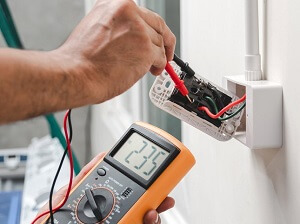What are the New Electrical Safety Checks?
First introduced on June the 1st 2020, the safety rules for electrical appliances will also apply to existing tenancies from the 1st of April 2021.
The latest round of regulations will help to ensure that fixed electrical installations (including electrical wiring) are safe and fit for the purpose.
As a result, a sizable number of tenancies will need regular inspections by qualified electricians, for things like electrical sockets and fuse boxes.
Note: Some exceptions apply to long leases (at least seven years), care homes, hospitals, hostels, hospices, to lodgers, and for social housing.
Extra Responsibilities for Landlords
From the 1st of April 2021, the new electrical safety requirement for landlords is to have their property electrics inspected and tested by a ‘qualified person’ every five (5) years.
So what happens if an electrical report highlights an issue? If so, the landlord must have the problem remedied within twenty eight (28) days. Failing to do so could result in a £30,000 fine.
Furthermore, landlords need provide their tenant (and local authority when required) with:
- Any relevant documentation used for remedial or further investigative work.
- A copy of the electrical installation condition report (EICR) – previously called the periodic inspection report.
Note: The Ministry of Housing, Communities & Local Government provides further guidance on how the Electrical Safety Standards in the Private Rented Sector (England) Regulations 2020 may affect landlords, their tenants, and local authorities.
Finding a Qualified and Competent Person
The electrical safety industry has further information about how to choose a qualified and competent inspector and tester. Their recommendations include:
- Electrical Safety Roundtable
- Electrical Competent Person (registered in the United Kingdom)
If you are a landlord of a privately rented accommodation you will need to:
- Ensure your property meets national standards for electrical safety (as per the 18th edition of the ‘Wiring Regulations‘).
- Get a qualified and competent person to inspect and test fixed electrical installations in rented properties (at least once every 5 years).
- Obtain the results of the report from the person who conducts the inspection and test and set an appropriate date for the next safety check.
 Supply a copy of the report to:
Supply a copy of the report to:
- The existing tenant no later than twenty eight (28) days of the inspection and test.
- Any new tenants (before they occupy the premises).
- Any prospective tenant (within 28 days of receiving a request).
- The local authority within seven (7) days of receiving a request for a copy.
- Keep a copy of the reports to make them available for the inspector and tester who will undertake the next checks.
- Complete any remedial or further investigative work within twenty eight (28) days (or sooner if specified in the report).
- Supply written confirmation of the completion of the remedial works from the electrician to the tenant and the local authority within twenty eight (28) days of completion of the works.
A landlord would not be in breach of their duty to comply with a remedial notice, providing they can show they took all reasonable steps to do so.
Note: The new Electrical Safety Regulations now cover Houses in Multiple Occupation (HMOs) after previous laws got repealed.
New Electrical Inspections and Tests
The main purpose of the required electrical inspection and test is to determine whether there are:
- Any overloaded electrical installations.
- Potential risks of electric shock and fire hazards.
- Any defective electrical works.
- Issues with a lack of earthing or bonding (systems built into appliances to prevent electrical shocks from hazardous installations).
The new Regulations only cover ‘fixed’ electrical installations, such as wiring, socket-outlets (plug sockets), light fittings, and the consumer unit (fuse box).
But, landlords can carry out portable appliance testing (PAT) on electrical appliances they provide or supply for their tenants (e.g. cookers, fridges, televisions).
Related Help Guides
- How to deal with tenants belongings after eviction.
- How to rent guide 2022 (PDF checklist for renting in England)
- Penalties for illegal renting in the United Kingdom.

